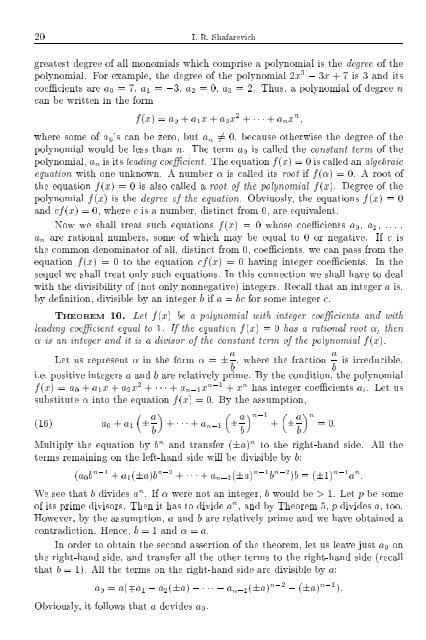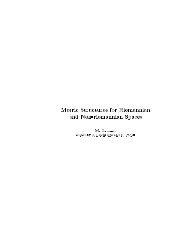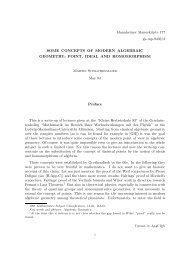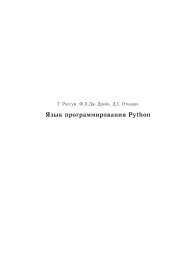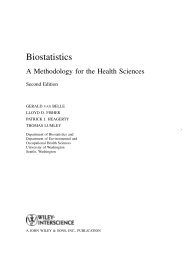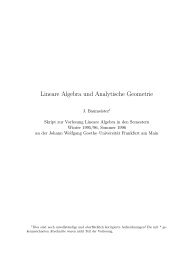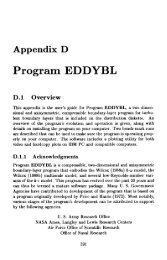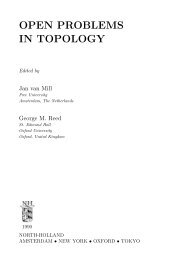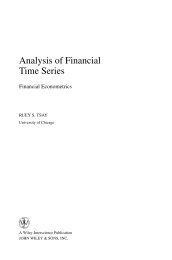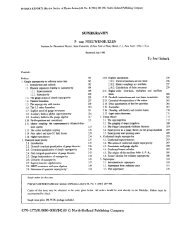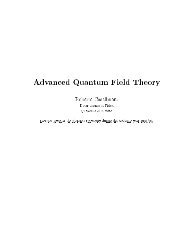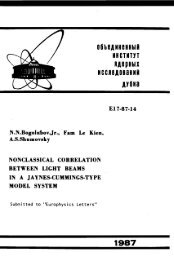SELECTED CHAPTERS FROM ALGEBRA I. R. Shafarevich Preface
SELECTED CHAPTERS FROM ALGEBRA I. R. Shafarevich Preface
SELECTED CHAPTERS FROM ALGEBRA I. R. Shafarevich Preface
Create successful ePaper yourself
Turn your PDF publications into a flip-book with our unique Google optimized e-Paper software.
20 I. R. <strong>Shafarevich</strong>greatest degree of all monomials which comprise a polynomial is the degree of thepolynomial. For example, the degree of the polynomial 2x 3 ; 3x + 7 is 3 and itscoecients are a 0 =7,a 1 = ;3, a 2 =0,a 3 =2. Thus, a polynomial of degree ncan be written in the formf(x) =a 0 + a 1 x + a 2 x 2 + + a n x n where some of a k 's can be zero, but a n 6=0,because otherwise the degree of thepolynomial would be less than n. The term a 0 is called the constant term of thepolynomial, a n is its leading coecient. The equation f(x) =0iscalledanalgebraicequation with one unknown. Anumber is called its root if f() =0. Arootofthe equation f(x) =0isalsocalledaroot of the polynomial f(x). Degree of thepolynomial f(x) is the degree of the equation. Obviuosly, the equations f(x) =0and cf(x) = 0, where c is a number, distinct from 0, are equivalent.Now we shall treat such equations f(x) = 0 whose coecients a 0 , a 1 , ... ,a n are rational numbers, some of which may be equal to 0 or negative. If c isthe common denominator of all, distinct from 0, coecients, we can pass from theequation f(x) = 0 to the equation cf(x) = 0 having integer coecients. In thesequel we shall treat only such equations. In this connection we shall have to dealwith the divisibility of (not only nonnegative) integers. Recall that an integer a is,by denition, divisible by aninteger b if a = bc for some integer c.THEOREM 10. Let f(x) be a polynomial with integer coecients and withleading coecient equal to 1. If the equation f(x) =0has arational root , then is an integer and it is a divisor of the constant term of the polynomial f(x).Let us represent in the form = a b , where the fraction a is irreducible,bi.e. positive integers a and b are relatively prime. By the condition, the polynomialf(x) =a 0 + a 1 x + a 2 x 2 + + a n;1 x n;1 + x n has integer coecients a i . Let ussubstitute into the equation f(x) =0. By the assumption,(16) a 0 + a a 1 + + a a n;1 a nn;1 + =0:bbbMultiply the equation by b n and transfer (a) n to the right-hand side. All theterms remaining on the left-hand side will be divisible by b:(a 0 b n;1 + a 1 (a)b n;2 + + a n;1 (a) n;1 b n;2 )b =(1) n;1 a n :We see that b divides a n . If were not an integer, b would be > 1. Let p be someof its prime divisors. Then it has to divide a n ,andby Theorem 5, p divides a, too.However, by the assumption, a and b are relatively prime and we have obtained acontradiction. Hence, b =1and = a.In order to obtain the second assertion of the theorem, let us leave justa 0 onthe right-hand side, and transfer all the other terms to the right-hand side (recallthat b = 1). All the terms on the right-hand side are divisible by a:a 0 = a(a 1 ; a 2 (a) ;;a n;1 (a) n;2 ; (a) n;1 ):Obviously, it follows that a devides a 0 .


